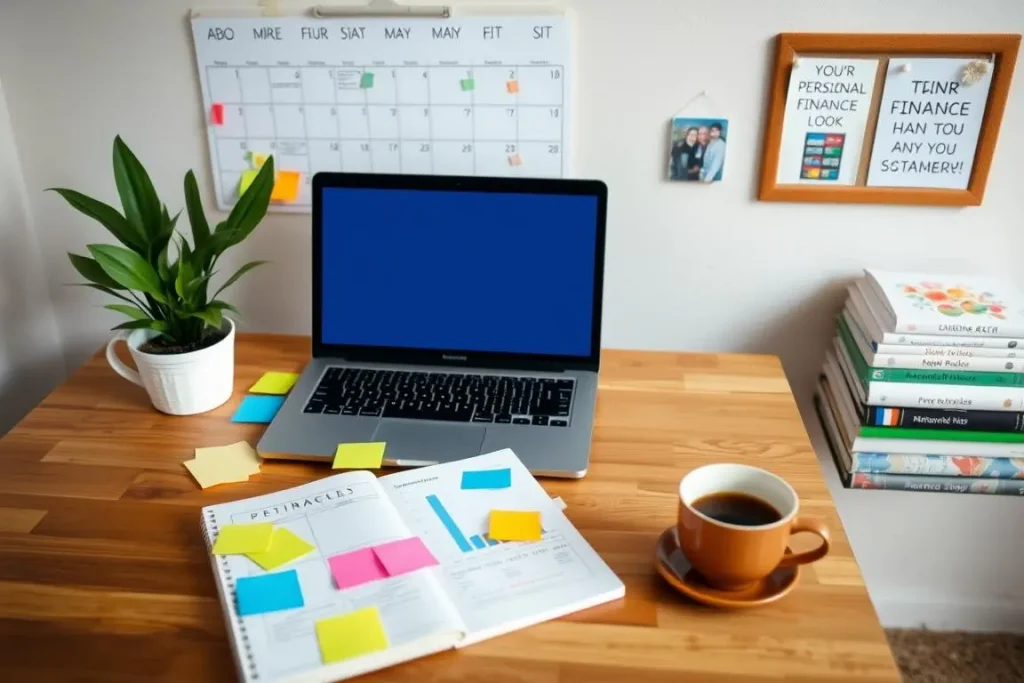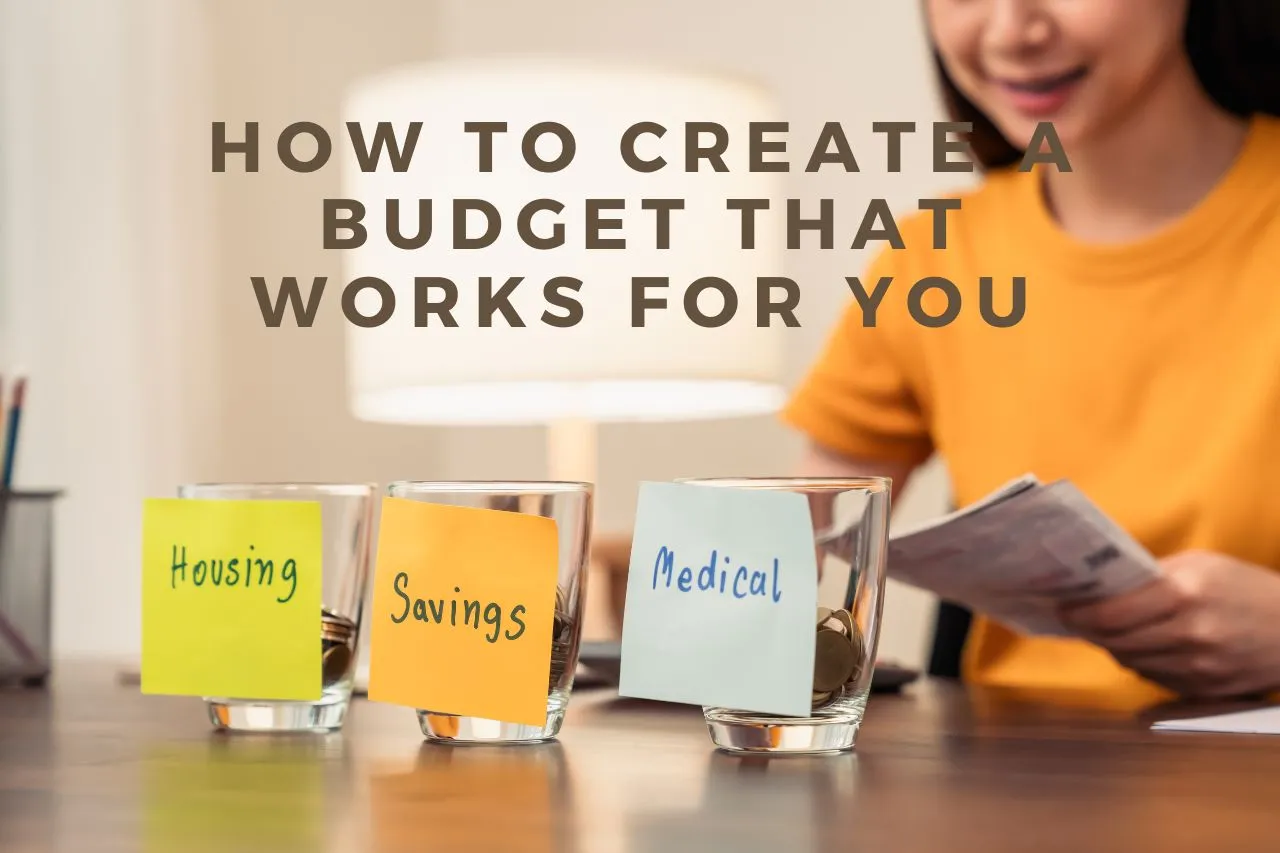Making a personal budget is key to financial stability and reaching your goals. We’ll share effective strategies and personal budgeting tips to help you make a budget that suits your life. This guide is for both beginners and those looking to improve their budget. It offers the tools and insights to manage your personal finance better.

A serene workspace featuring a wooden desk with a laptop, colorful sticky notes, a notebook filled with graphs and charts, a cup of coffee, and a potted plant; a calm background showcasing a wall calendar with marked dates, financial books stacked neatly, and a small bulletin board displaying inspiring images related to personal finance.
Key Takeaways
- Creating a personalized budget is vital for financial stability and goal achievement.
- Knowing the importance of budgeting and debunking myths will help you make a better budget.
- Use essential personal budgeting tips to create a budget that matches your lifestyle.
- It’s important to regularly review and adjust your budget to keep financial control.
- Budgeting helps you make smart financial choices and achieve your financial dreams.
Understanding the Importance of Budgeting
Creating a personal budget is key to financial success. It’s not just about tracking spending. It’s a powerful tool for controlling your finances, reducing debt, and achieving your goals.
Why Budgeting is Crucial for Financial Success
Budgeting helps you understand your income and expenses. This lets you make smart choices about your money. It shows where you can spend less and save or pay off debt. By budgeting, you make sure your spending matches your priorities and goals.
Common Budgeting Myths Debunked
Many think budgeting is too hard or limits their freedom. But these ideas stop people from seeing budgeting’s real benefits. Let’s clear up some common myths:
- Budgeting is complicated: Creating a budget can be simple with today’s many budgeting tools and apps.
- Budgeting means giving up everything: Budgeting is about balancing your needs, wants, and goals, not cutting out everything.
- Budgeting is only for those in debt: Budgeting helps everyone, whether you’re paying off debt or not.
Seeing budgeting as a personal budgeting tip and a tool for creating a budget that fits your life and goals is crucial. It’s the way to start with budgeting for beginners and see long-term success.

A visually appealing workspace with a wooden desk, neatly arranged budgeting tools such as a calculator, colorful charts, and financial documents. In the background, a large window revealing a bright and inspiring cityscape, plants on the windowsill, and a cup of coffee. The atmosphere conveys organization and focus on personal finance management, with soft lighting enhancing the serene environment.
“A budget is telling your money where to go instead of wondering where it went.”
Essential Personal Budgeting Tips to Create a Budget That Works
Making a personal budget that fits your financial needs and lifestyle can change the game. We’ll guide you through a step-by-step process to make a budget that suits you. You’ll learn key personal budgeting tips and strategies to track your income, sort your expenses, and manage your money well. This section is perfect for budgeting for beginners or those looking to improve their budget. It gives you the tools and knowledge to control your financial future.
Identify Your Income Sources
First, figure out your total monthly income. List all your income sources, like your main job, side gigs, investments, and any other money-making activities.
Categorize Your Expenses
Then, sort your expenses into must-haves (like rent, bills, and food) and nice-to-haves (like fun activities and eating out). This helps you see where you can save or spend smarter.
| Essential Expenses | Non-Essential Expenses |
|---|---|
| Rent/Mortgage | Dining Out |
| Utilities (Electricity, Water, Internet) | Subscriptions |
| Groceries | Entertainment |
| Transportation (Fuel, Car Payment) | Shopping |
| Insurance (Health, Auto, Life) | Travel |
Track Your Spending
It’s important to keep an eye on where your money goes. Use a budgeting app, spreadsheet, or a notebook to track your spending. This helps you spot areas to save and spend smarter.
Set Realistic Goals
Set your financial goals, like paying off debt, saving for a big purchase, or building an emergency fund. Break these goals into smaller steps and add them to your budget.
“A budget is telling your money where to go instead of wondering where it went.”
By using these personal budgeting tips, you’re on your way to a budget that meets your financial goals. Remember, budgeting is ongoing, and it might take time to get it right. But, the benefits of a good budget are huge.
Making a personal budget is a key step towards financial stability and reaching your goals. It helps you understand budgeting’s importance, clears up myths, and gives you the right tips. This will help you make a budget that fits your life.
By following the tips in this article, like knowing your income and expenses, and setting goals, you’re ready to start. Keep track of your spending, adjust as needed, and save automatically. This way, you can manage your personal finance better and make smart choices for your budgeting for beginners and create a budget that suits you.
Personal budgeting is a journey, not just a one-time task. By using the personal budgeting tips and making it a habit, you’re on your way to financial success. Stick with it, and you’ll see how it improves your personal finance and overall well-being.
FAQ
What is the importance of budgeting?
Budgeting is key to financial success. It helps you manage your money better, reduce debt, and reach your financial goals. By making a budget, you can keep track of your income and expenses. You can also decide how to spend your money based on what’s important to you.
How do I create a budget that works for me?
Start by tracking your income and spending. Then, sort your expenses into must-haves and nice-to-haves. Put your money where it matters most to you. Look for ways to spend less in some areas and use that money for your goals.
What are some common budgeting myths?
Some think budgeting is too strict, only for low-income folks, or takes too much time. But, budgeting can be flexible and tailored to your finances. It’s a powerful tool for everyone, no matter your income.
How do I track my expenses?
You can track expenses with a budgeting app, a spending journal, or by checking your bank and credit card statements. Categorizing your spending helps you see where you can cut back.
How often should I review and update my budget?
Review and update your budget often, usually every month. This helps you adjust your spending and savings goals. It keeps your budget in line with your current finances.

